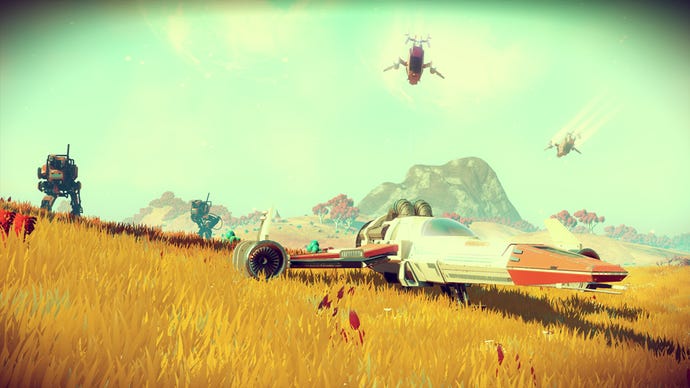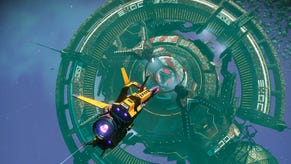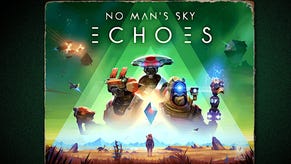No Man's Sky has a beautiful galaxy to explore, but is that enough?
Technically impressive, stunning to look at, but - whisper it - it's a bit dull.
"If you like the idea of exploring an infinite galaxy at your own pace then I couldn't recommend it enough. If you were expecting an actual game under all of that framework though, you might be entirely disappointed."
Seeing Sean Murray talk about No Man's Sky is a religious experience. He's given this same presentation multiple times today to hordes of journalists from all over Europe but he's still incredibly enthusiastic, bouncing around the stage with a nervous energy that's infectious.
This is very clearly his baby and the entire team seem to share his enthusiasm, they're milling around, smiling and wearing matching t-shirts. It's an odd event, everyone is clearly excited to be showing off the game they've been quietly working away on for several years since the game's announcement at VGX 2013.
Before we can play the game, Sean is going to show us how some of No Man's Sky's near infinite planets are made. Not many hands on sessions start with the game's creators showing you how they created the world, but that's part of the magic; all we know about No Man's Sky so far is that there are worlds, they are procedurally generated, and there are over 18 quintillion of them.
Sean is standing on an entirely flat planet. This is a base, a complete sphere for layering things on top of. Sean starts by applying a sine-wave to the planet, turning it into a giant golf ball, and then applying several more sine-waves. Something distinctly planet-looking is forming in front of my eyes and, here's the mind blowing part, there hasn't been a single loading screen since he started.
Technically it's a masterpiece. "These are all graphs, all I see here is graphs" says Sean, adding a sea-level and dunking himself into one of the planets newly created lakes, swimming to the surface to reveal something more akin to the vibrant environments most players are familiar with. Still no loading screens.
"I wanted to capture a feeling" Sean says to round off the presentation. "I'm the first person that's ever been here, perhaps the only person that'll ever be here. This means I can't look up a YouTube video or guide to help me through it - I'm genuinely exploring. I'm genuinely discovering."
As the presentation ends the excitement to play the game is palpable. You can feel it in the room as people move towards the consoles.
Which, sadly, makes what I played all the more disappointing.
My big concern coming into the preview was: what do you do in No Man's Sky? Most of the time you explore the universe, looking to scavenge items to craft, trade and stockpile so that you can explore the universe.
Sometimes the exploration feels rewarding: scanning something with your binoculars will let you examine it and catalogue it. If you're the first to discover it then you can name it, but otherwise you'll be able to see its name and the player that chose it.
The idea that someone else might one day, months down the line, find your discoveries is one of the biggest draws here - because even though everyone will be exploring the same galaxy, it's so lonely.
To explore you'll need to survive. Primarily this means crafting the requisite item to adapt to the crappy weather of this planet; maybe it's too hot, or too cold. Maybe the rain is acid and you'll die if you stay out in it.
There are other dangers too, space pirates occasionally appear, announcing their arrival in a hail of laser-fire. If you destroy anything or kill too many of the indigenous creatures while planetside, you'll get a GTA-style wanted level and tiny floating robots will engage you in battle, also communicating in little red hot flashes of death.
If it's not trying to kill you, it often just doesn't care enough to interact. Trade ships lazily float in space while animals are often as dismissive as they are grotesque. You'll often find yourself cooing in amazement at fascinating creatures that potentially no one has ever seen before.
The odd alien NPC that doesn't kill you on sight won't even speak your language, which only increases the isolation. You can learn their language and slowly pick it up either from the aliens themselves or from monoliths dotted about the place.
"The idea that someone else might one day, months down the line, find your discoveries is one of the biggest draws here - because even though everyone will be exploring the same galaxy, it's so lonely."
You could even visit a space-station that no one has ever seen before and look out of a porthole at planets no one has ever visited. This isn't hyperbole, but something that can actually happen. The game's future-science aesthetic really works for me too, all space age towers and vibrant colours.
There was nothing like getting in my ship, a beautifully bulbous thing with gigantic thrusters bolted to the side, and taking off into space to admire the planet I was just lounging on from a nearby space station. Again, no loading screens as I bounced between the four planets I could travel to in this hands-on session. The distances are long too, with travel times of several minutes to get between the planets. There's a few speed boost mechanics to get you where you need to be faster, but travelling between planets takes a long time.
Sadly, exploration is the only thing there is to do and, if exploration isn't enough for you, the whole experience feels deeply unfulfilling. There's some fun here but you have to really work for it.
The act of gathering is largely just looking for a structure on the horizon or from your ship and travelling towards it, occasionally letting out a ping to highlight objects of interest nearby.
During the hands-on I found myself frequently bored, even while those around me seemed rapturous with delight. The shooting felt floaty, and, while there's some cool tech that lets you blow holes in the ground with grenades, there doesn't appear to be anything on the ground to actually fight beyond the droids you anger by destroying the worlds you visit.
A big argument against No Man's Sky is going to hinge on the $60 price point and I think in terms of the work that's gone into it, it's absolutely worth that price. Aesthetically and technically it's a massive achievement, and if you like the idea of exploring an infinite galaxy at your own pace then I couldn't recommend it enough. If you were expecting an actual game under all of that framework though, you might, like me, be entirely disappointed.
Much like the uncaring universe contained within it, it seems No Man's Sky doesn't really care what you do with it, whether you enjoy yourself or not. It's got its own set of rules, and you live within them or get crushed.
No Man's Sky is out for PS4 and PC in June.












.jpg?width=291&height=164&fit=crop&quality=80&format=jpg&auto=webp)
.jpg?width=291&height=164&fit=crop&quality=80&format=jpg&auto=webp)
